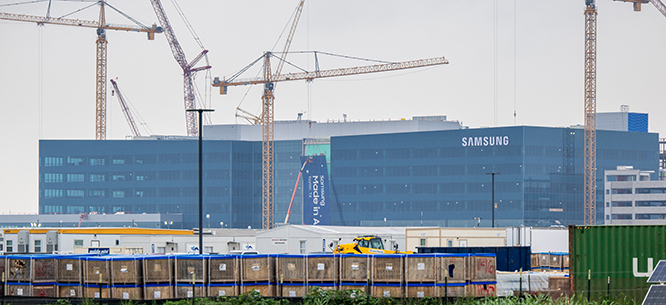Rebuilding the Democratic Coalition
Rebuilding the Democratic Coalition
While some have argued that the Biden administration’s industrial policy offered too much to the private sector, these bills were designed to serve multiple constituencies.

Whatever you think about Joe Biden, the achievements of Bidenomics deserve celebration. The Biden administration bucked economic orthodoxy by boosting household income, which successfully lowered the child poverty rate, including for nonwhite households. And it initiated supply policies to address shortages in the global economy while promoting workers’ rights. The three major industrial policies that form the centerpiece of Bidenomics embedded social protections, labor interests, and environmental justice into American economic policy. In the process, the Biden administration has begun to rebuild coalitions with groups that were abandoned by past Democratic administrations.
When Biden came into office in 2021, the world was still in the middle of a global pandemic with enormous economic repercussions. In response, Democrats implemented an unprecedentedly large fiscal stimulus package, which included additional weekly payments of $600 and later $300 to those receiving unemployment insurance. In defiance of Democratic economic advisors like Larry Summers and Jason Furman, who argued that this spending risked increasing inflation, the Biden administration passed still more fiscal stimulus, as well as enhancing the Child Tax Credit to directly support low-income households. This material support reduced child poverty.
The Biden administration also entered the White House determined to reverse Trump’s attacks on the environment and labor. The Trump administration weakened hundreds of pollution regulations, including emissions standards reporting requirements and waste dumping regulations for coal mines. It appointed anti-union members to the National Labor Relations Board, which subsequently rolled back numerous Obama-era protections for workers, including the right to organize at franchises and requirements that legal settlements in favor of workers provide “full remedy” for violations.
The Biden administration’s three major industrial bills use a mix of carrots (private incentives, public investment, and low-cost lending) and sticks (tax enforcement, hiring requirements, and stringent environmental standards) to sustainably promote domestic industry and reduce carbon emissions. The Bipartisan Infrastructure Law provides $550 billion over five years to support improvements and construction of transit infrastructure, including roads and bridges, public transit, and rail service, as well as water sanitation and environmental remediation, particularly for rural and nonwhite communities. The CHIPS and Science Act offers more than $280 billion to increase resilience to global shortages of intermediate goods, chiefly semiconductors used in myriad products (like cars and refrigerators) and essential integrated services like healthcare and communications. It also supports domestic workers through explicit labor standard requirements for the provision of child care. The Inflation Reduction Act (IRA) offers more than $400 billion in spending on energy infrastructure (including on tribal lands) and tax credits for firms working to decarbonize. The IRA also raises taxes for households with incomes above $400,000, with progressively higher rates for the top earners; creates a minimum corporate tax rate of 15 percent for corporations with average earnings of more than $1 billion; and increases funding for the IRS to ensure that it can recover billions of dollars owed by individuals and firms that have evaded paying taxes in recent history. It also includes measures to tax corporate stock buybacks and reimpose a Superfund excise tax on hazardous substances. These measures all work to decrease fiscal deficits that conservative administrations have historically and cynically used to avoid public investment.
While some have argued that these bills offered too much to the private sector, this critique ignores how the pillars of Bidenomics serve multiple constituencies. Organized labor has long supported tariffs on imports like those contained in the CHIPS Act. Nonwhite communities and tribal groups are benefiting from plans to develop energy infrastructure and clean up pollution in their communities; hundreds of millions of dollars have been spent on these initiatives thus far. Households vulnerable to pollution and weather volatility are helped by policies that increase the stringency of emissions standards and funds earmarked for weather-proofing homes. Universities will be bolstered by new money for academic research that reverses decades of cuts to funding. Rural areas will see improvements from investment in clean water infrastructure. And a majority of IRA development projects are occurring in red states, making it harder for future political administrations to shut them down. There is no guarantee that the groups served by these policies will credit the Biden administration for the improvements to their lives and environments, but such tangible action could pave the way to future support.
The persistent lack of recognition for the achievements of Bidenomics is a political puzzle. Polling at the time of writing shows general discontent with unemployment, inflation rates, and high housing prices; as of May 2024, a majority of Americans believed the U.S. economy was in a recession, though nominal GDP has steadily increased since the first quarter of 2021, and real GDP has increased since the second quarter of 2022. Despite persistent inflation between 2021 and 2023, real wages have grown across the income spectrum, with the greatest gains for the lowest income levels: 13.2 percent for the lowest decile, compared to 4.4 percent for the top decile. Some of the discontent may be fallout from the Federal Reserve’s inflation targeting policies, which have raised interest rates, hindered home building, and calcified housing’s consistent contribution to overall inflation. Congress also limited the potential appeal of Bidenomics. Conservative Democrats like Joe Manchin blew up the enhanced Child Tax Credit and the Build Back Better Act, which had included hundreds of billions of dollars more for industrial spending, large expansions of social services, and mandated sick and care leave for families.
The stakes of a Democratic loss in 2024 are high. To win, Democrats should maintain their commitment to these precedent-breaking policies and remind voters of what they stand to lose.
Nina Eichacker is an associate professor of economics at the University of Rhode Island.






